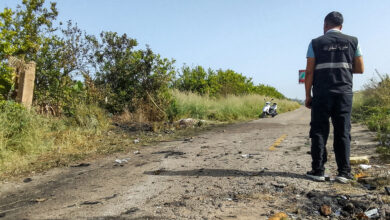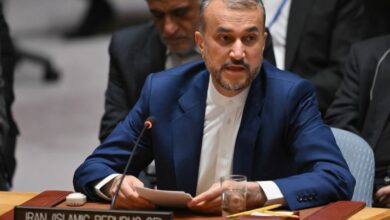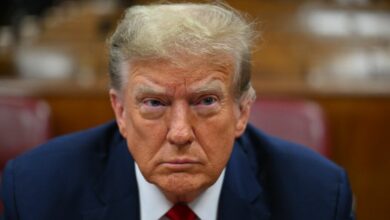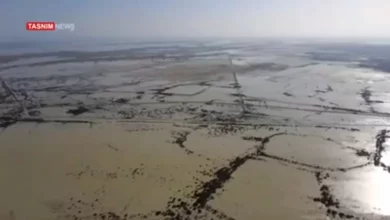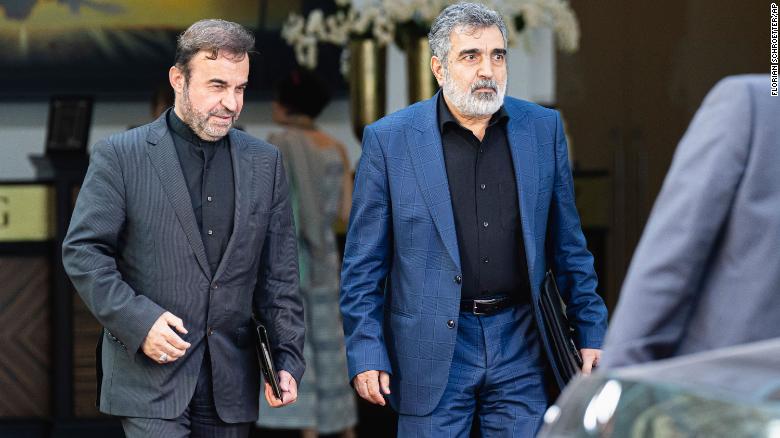
London/Abu Dhabi (CNN) – After yet another round of talks on reviving the Iran nuclear deal last week, the country’s negotiators are now consulting with the leadership in Tehran on how to proceed. European Union officials say they have presented a “final,” take-it-or-leave it text for the US and Iran to consider.
The draft has been met with guarded optimism in Iran. Mohammad Marandi, adviser to Iranian negotiators in Vienna, told CNN that the text to resuscitate the agreement that former US President Donald Trump pulled out of in 2018 has “evolved significantly” in recent months. But he also said that supplementary negotiations will be needed over a sticking point that emerged earlier this summer.
In June, the United Nations’ International Atomic Energy Agency censured Iran for traces of uranium that were found at three of its main nuclear sites.
Marandi said that in order for Iran to sign up to the updated deal, the IAEA’s censure “has to be closed once and for all.”
Iran dismissed the IAEA motion as “politicized,” and responded by removing surveillance cameras at key sites in response — a move that deprived negotiators of up-to-date information on the country’s uranium enrichment program and appeared to doom the prospects of striking a deal.
So, when negotiators returned to Vienna last week, observers were surprised. Tehran’s guarded endorsement of the latest draft agreement has raised the possibility of an imminent return to the deal, despite the remaining hurdles. Even the country’s hardliners — staunchly opposed to the agreement since it was signed by then-President Hassan Rouhani government and the Obama administration in 2015 — have praised the draft as an improvement from its previous versions.
Yet Iran continues to drag its feet, as it has done since the Biden administration restarted talks to restore the deal nearly a year and a half ago. One reason, Iranian analysts argue, is because of the outsized influence wielded by one man absent from the negotiations: Trump. Analysts argue that Iran has premised the talks on the possible victory of a Republican candidate aligned with Trump — or even Trump himself — in the 2024 US presidential elections. Biden’s successor, according to Iran’s calculus, would pull out of the deal once again, unleashing a new torrent of sanctions on the country.
“The shadow of Trump looms over these talks by virtue of them having been dragged out over the past year as Iran has focused a lot on securing economic guarantees,” said Mohammad Ali Shabani, editor of Amwaj.media, a London-based outlet focused on Iran, Iraq and the Arabian Peninsula.
“If US secondary sanctions return, as we saw when Trump left the deal and all the major Western private sector companies ran away and never looked back, how do you prevent that?” Shabani said. “What kind of mechanisms can you set up to prevent that from happening again?”
Secondary sanctions are a US mechanism that penalizes any government or organization that has financial dealings with sanctioned entities.
In a development that risks adding another hurdle to the talks, the US Justice Department announced criminal charges Tuesday against a member of Iran’s Islamic Revolutionary Guard Corps for allegedly trying to orchestrate the assassination of John Bolton, who served in senior national security positions during the Trump and Bush administrations.
Still, the Iranians have a lot to gain by re-entering the deal, if even for a short period.
Sanctions relief could free up tens of billions of dollars in oil and gas revenues over the next two years, buoying a floundering Iranian economy and bolstering the popularity of Iran’s hardline President Ebrahim Raisi, Shabani said.
Conversely, there is a lot at stake for the international community if negotiations continue to falter. Since Trump withdrew from the negotiations and launched an aggressive sanctions regime in May 2018, Tehran has enriched uranium at higher levels and at an increasing speed. The UN nuclear watchdog said in June that Iran was weeks away from having a “significant quantity of enriched uranium,” but added that it “does not mean having a bomb.”
Moreover, time continues to be of the essence as the protraction of the negotiations complicate the talks. Earlier this year, an Iranian demand for the removal of its Revolutionary Guards from the US terror list was believed to be the final hurdle to reviving the deal. Now that issue appears to be off the table. But the progression of Iran’s uranium enrichment program has thrown another wrench in the wheels, leading to the IAEA’s censure of Tehran.
Iran accuses the West of trying to weaponize the IAEA censure, using it as legal pretext to pull out of a future deal. Marandi told CNN that rescinding the motion was a precondition for the agreement’s revival.
“Otherwise Iranians have no doubt that the Americans will take advantage of this, or use this as a tool to undermine the agreement within weeks or at most months. This is a precondition for the implementation of a deal,” Marandi told CNN.
Still, there is cause for some optimism, and even kicking the can down the road may have its benefits.
Even if the deal is reneged again in 2025, Shabani argued, an imminent return to the deal “gives breathing space to both sides.”
“The US gets to put the nuclear genie back in the bottle for three years and then it can deal with it in 2025 one more time,” said Shabani.

